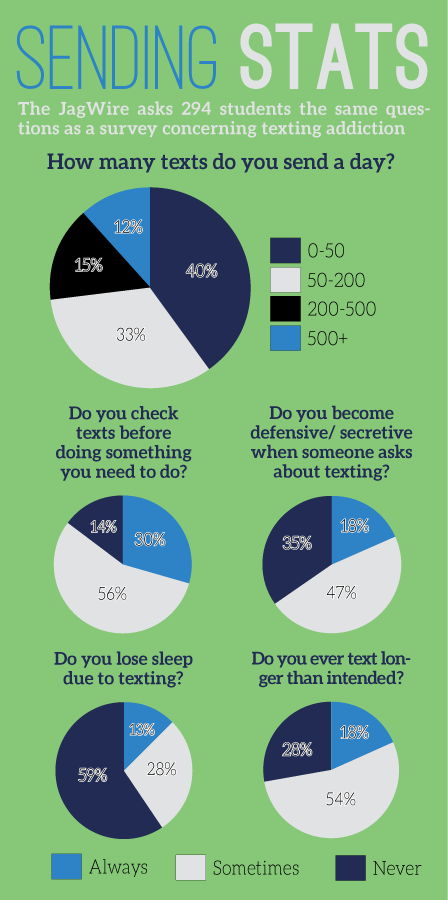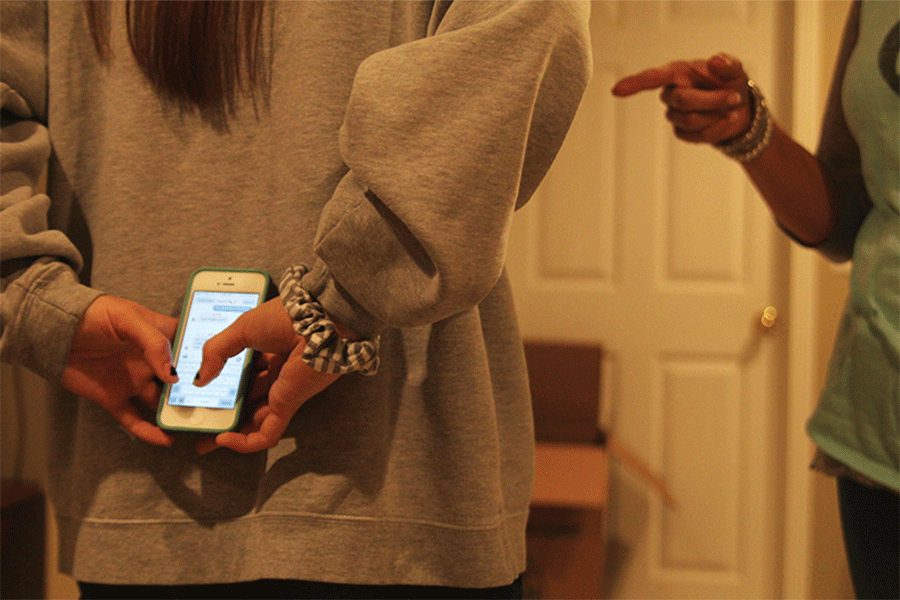Photo illustration.
Compulsive texting found in teens
Students can be negatively impacted by texting too much, study finds
November 13, 2015
Completing her homework after school, senior Ally Henderson finds the constant receival of texts from friends distracting, hindering her ability to finish her assignment.
“I’ll be doing an assignment and someone will text me and we’ll have a full conversation. I’ll have to end it and explain that I’ve got homework,” Henderson said. “I get the work done, but it takes a lot longer to finish than it should.”
Like Henderson, most American teenagers text on a regular basis: In 2012, a study done by senior research specialist Amanda Lenhart and published the to Pew Internet & American Life Project found 63 percent of teenagers said they text every day, and only one percent said they text less than once a week.
A study done by Delaware County Community College researcher Kelly M. Lister-Landman and published by the American Psychological Association showed an abundance of Delaware County area students that compulsively text. Her study did not find the cause of compulsive texting; it just showed that compulsive texting does exist.
 Lister-Landman used a questionnaire consisting of questions such as, “Do you ever find that you text longer than you intended?” and “Do you ever try to cut down the amount of texting and fail?” The questions determined if the student was considered a compulsive texter. The study also showed that academic performance tends to decrease as compulsive texting increases in teenage girls, but not in teenage boys.
Lister-Landman used a questionnaire consisting of questions such as, “Do you ever find that you text longer than you intended?” and “Do you ever try to cut down the amount of texting and fail?” The questions determined if the student was considered a compulsive texter. The study also showed that academic performance tends to decrease as compulsive texting increases in teenage girls, but not in teenage boys.
“We asked questions about the participants daydreaming about their phone, feeling uneasy when they weren’t able to use it, trying to cut back on texting and failing, and so on,” Lister-Landman said via email.
The study also referenced a 2013 study by Nila Nathan and Jamie Zeitzer published in BioMed Central public health, which indicated that there was a correlation between the perceived need for texting and daytime sleepiness. Lister-Landman’s study claimed it could be this lack of sleep that is causing lower academic performance, and that the perceived need to text demonstrates compulsive behavior.
In line with the findings of the study, texting has affected Henderson’s sleeping patterns.
“I stay up late texting [and] I do get less sleep because of it,” Henderson said.
According to Lister-Landman, researchers need more data about the subject in order to find the causes of compulsive texting.
“So far, we haven’t determined any causes for compulsive texting. At this stage, we’re simply trying to see how many people are affected by it and how we can classify it,” Lister-Landman said. There isn’t enough research on compulsive texting yet to be able to answer the question about the cause(s) of it. It could relate to personality characteristics, brain functioning, learned behaviors that are modeled after the behaviors of others, and the list goes on and on.”
Based on a JagWire survey using the same questions as Lister-Landman’s study, almost 30 percent of students always check texts before doing something else they have to do.
Lister-Landman’s research also found that girls are more negatively affected by compulsive texting.
“As compulsive texting increases, academic adjustment decreases — for girls only,” Lister-Landman said. “Girls likely have higher rates because texting is a very social behavior, and girls tend to be more preoccupied with talking about and thinking about their social relationships than are males.”
At Mill Valley, choir director Sheree Stoppel has seen more cellphones in the halls than ever before.
“I know that I see a lot more cellphones in the hallways,” Stoppel said. “If I have plan and I’m running to the office and there’s somebody going from one classroom to another, they’re on their phone.”
A self-proclaimed “cellphone police,” Stoppel does not allow students to have a cellphone on their person. She stipulates that students’ cellphones have to remain in their backpacks, which are set to the side during the class. Stoppel believes cellphones distract from the class.
“People think they can multitask and they can’t, because they’re not in the moment. Whatever you do in a class, it should take priority, that should be the focus,” Stoppel said.
While senior Austin Mackey doesn’t text very regularly during the day, he finds that multitasking becomes harder when he does.
“If I ever do text when I study, everything goes a lot slower,” Mackey said. “I’m doing a math problem, and then I send a text, and then I come back and I’m completely lost at what I was doing.”
Despite being an avid texter, Henderson still sees the problem with compulsive texting.
“For some it’s all they do, and some people nowadays hide behind their phones and say whatever they want and ignore their surroundings,” Henderson said.
Lister-Landman does not see compulsive texting becoming less of a problem in the future, but hopes for more research in order to more accurately classify the effects of it.
“As cellphone usage is only increasing and is easier/more affordable over time, it seems safe to say that compulsive texting will continue to be an issue going forward,” Lister-Landman said. “Therefore, it’s imperative to build on our research since texting most certainly isn’t going away.”
